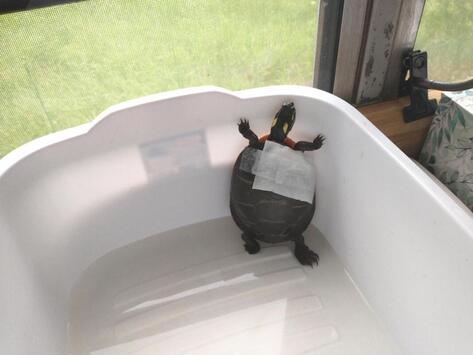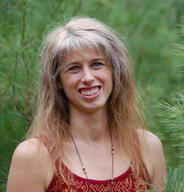|
I’m writing this on Earth Day. It’s cool and damp where I live in the Northeast of the United States, close to the border with Canada. The weather here has been going back and forth between winter and summer, refusing to settle into anything like a typical spring. Buds appeared on trees and then stalled. I’m standing under a yellow birch, and I can feel the tree holding its breath, waiting for the right moment for a big, green exhale.
Over the past week, I have taken part in a few events inspired by Earth Day: an interfaith conference, a college sustainability committee’s lunch program, and a fundraising and outreach event with my regional wildlife rehabilitator organization. I’m a volunteer licensed to temporarily care for injured and orphaned native animals so they can heal or grow and return to their wild lives. I primarily care for turtles who’ve been hit by cars while trying to cross the road. The number of turtles is decreasing everywhere, and half of the world’s turtle species are close to extinction. Each turtle I help is a sacred individual but also part of a larger conservation challenge. The heart-centered work of wildlife rehabilitation spirals into my evolving spiritual connection with nature and informs my deep concern over the loss of biodiversity on our planet. Some of my favorite authors have beautiful ways to describe how humans experience biodiversity, the variety of life with which we share the Earth. Ecologist and philosopher David Abram calls it “utter weirdness and dark wonder.” Deborah Bird Rose, who studied Aboriginal ecological philosophy and cared for orphaned flying foxes in Australia, called it “shimmer.” Behavioral scientist Stephan Harding calls it “being Gaia’d.” It’s that feeling you get when you connect deeply with the more-than-human world. Today, Earth Day, approximately 600 species of animals, insects, and plants will go extinct. That number repeats every day. You and I probably can’t name any of them and won’t even know they are gone, but there is something deep in our sensate beings that will miss them. Contact with the weirdness, wonder, and shimmer of the natural world makes the experience of being human extraordinary. I volunteer with wildlife rescue because I am making a difference. The thing I hear the most when finders bring me animals is an apologetic, “I know it’s just a…turtle, squirrel, seagull, frog, snake, pigeon, mouse.” I assure each of them that, to me, no being is “just” anything. Each is weird and wonderful, and I am going to do my best to keep even the smallest bit of shimmer in the world. I am deeply grateful for the humans who help by taking the time to bring an animal to me or another wildlife rehabilitator for care. Looking up again at the budded branches of the yellow birch above my head, I notice that I am also holding my breath. What am I waiting for? I’m not sure. Perhaps there will be a moment when all humans realize what you and I know already – that the world is full of marvelous and miraculous beings who delight our senses and invite us to bring our strange humanness back into the web of life. That will be the moment we all take a big, green exhale. From my heart to yours, Debbie Philp OMEC Board of Directors Comments are closed.
|
Details
Archives
June 2024
Categories |


 RSS Feed
RSS Feed
